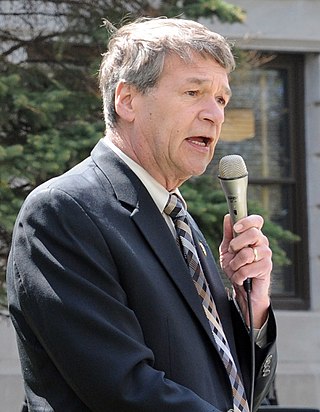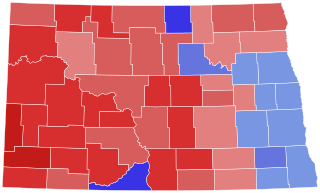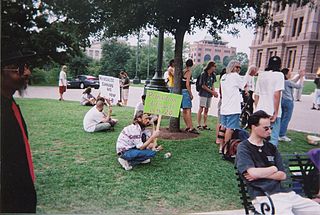Related Research Articles

Mary Kathryn "Heidi" Heitkamp is an American politician who served as a United States senator from North Dakota from 2013 to 2019. A member of the North Dakota Democratic–Nonpartisan League Party, she was the first woman elected to the U.S. Senate from North Dakota. Heitkamp served as the 28th North Dakota attorney general from 1992 to 2000 and 20th North Dakota tax commissioner from 1986 to 1992. As of 2023, she is the last Democrat to have represented North Dakota in Congress, and the last to hold statewide office.

Wayne Stenehjem was an American lawyer and politician who served as the 29th Attorney General of North Dakota from 2000 until his death in 2022. He sought the Republican nomination for governor of North Dakota in 2016 but lost the primary on June 14 by 20%.

The 2012 United States Senate election in North Dakota took place on November 6, 2012, concurrently with the 2012 U.S. presidential election, other United States Senate elections, United States House of Representatives elections, and various state and local elections. Incumbent Democratic-NPL Senator Kent Conrad decided to retire instead of running for reelection to a fifth term.

In the United States, cannabis is legal in 38 of 50 states for medical use and 24 states for recreational use. At the federal level, cannabis is classified as a Schedule I drug under the Controlled Substances Act, determined to have a high potential for abuse and no accepted medical use, prohibiting its use for any purpose. Despite this prohibition, federal law is generally not enforced against the possession, cultivation, or intrastate distribution of cannabis in states where such activity has been legalized.

The legal history of cannabis in the United States began with state-level prohibition in the early 20th century, with the first major federal limitations occurring in 1937. Starting with Oregon in 1973, individual states began to liberalize cannabis laws through decriminalization. In 1996, California became the first state to legalize medical cannabis, sparking a trend that spread to a majority of states by 2016. In 2012, Washington and Colorado became the first states to legalize cannabis for recreational use.

The 2016 North Dakota gubernatorial election was held on November 8, 2016, to elect the Governor and Lieutenant Governor of North Dakota, concurrently with the 2016 U.S. presidential election, as well as elections to the United States Senate, elections to the United States House of Representatives and various state and local elections. This would have been the first time North Dakotans selected a governor under new voter ID requirements, in which a student ID was insufficient identification to vote, but a court ruling in August 2016 struck the down the provision; the election was held under the 2013 rules.

Cannabis in Tennessee is illegal for most use, with the exception of limited medical purposes. Possession of even small amounts is a criminal misdemeanor, but there are limited legal allowances for non-psychoactive CBD oil as medical cannabis, and the authorities have not been able to enforce the law.

Cannabis in North Dakota is legal for medical use but illegal for recreational use. Since 2019 however, possession under a 1/2 ounce has been decriminalized in the sense that there is no threat of jail time, though a criminal infraction fine up to $1,000 still applies. The cultivation of hemp is currently legal in North Dakota. In November 2018, the state's voters voted on recreational marijuana legalization, along with Michigan; the measure was rejected 59% to 41%. Two groups attempted to put marijuana legalization measures on the June 2020 Primary and the November 2020 elections, but were prevented from doing so by the COVID-19 pandemic.

Cannabis in Virginia is legal for medical use and recreational use. The first medical marijuana dispensary opened in August 2020, and adult recreational use became legalized in July 2021.

Cannabis in Kansas is fully illegal, and possession of even small amounts is a misdemeanor crime. Cannabis is only legal in Kansas in the form of THC free cannabidiol oil, also known as CBD.

The 2018 United States Senate election in North Dakota took place on November 6, 2018, to elect a member of the United States Senate to represent the State of North Dakota, concurrently with other elections to the U.S. Senate, as well as other federal, state and local elections in North Dakota.

Cannabis in Texas is illegal for recreational use. Possession of up to two ounces is a class B misdemeanor, punishable by up to 180 days in prison and a fine of up to $2000. Several of the state's major municipalities have enacted reforms to apply lesser penalties or limit enforcement, however.

Cannabis in North Carolina is illegal for any use except for very limited medical usage, though decriminalized for possession of 0.5 ounces or less for individuals with three or fewer misdemeanor convictions.

Cannabis in New Hampshire is illegal for recreational use and decriminalized for possession of up to three-quarters of an ounce (21 g) as of July 18, 2017. Medical use is legal through legislation passed in 2013.

The 2018 United States House of Representatives election in North Dakota was held on November 6, 2018, to elect the U.S. representative for North Dakota's at-large congressional district. The election coincided with the U.S. Senate election, as well as other statewide, legislative, and local elections.
Janne Myrdal is a Republican member of the North Dakota Senate, representing the 19th district. Myrdal was first elected in 2016 to the 10th district, and re-elected in 2020. She is known for her anti-abortion activism and opposition to LGBTQ rights.
Karla Rose Hanson is an American politician who has served in the North Dakota House of Representatives from the 44th district since 2016.
Kristin Roers is an American politician. She is a member of the North Dakota State Senate from the 27th District, elected in 2018. She is a member of the Republican party.
James P. "Jim" Roers is an American politician and businessman serving as a member of the North Dakota Senate from the 46th district. He assumed office on December 1, 2016.
References
- 1 2 "About Roers | Roers | Building Success". Roers. Retrieved 2020-03-25.
- ↑ North Dakota Secretary of State. "Official Results General Election - November 8, 2016". results.sos.nd.gov. Archived from the original on 2017-04-19. Retrieved 2020-03-25.
- ↑ "2020 General Election Results". results.sos.nd.gov. North Dakota Secretary of State. Archived from the original on 2020-11-23.
- ↑ "2016 General Election Results". results.sos.nd.gov. North Dakota Secretary of State. Archived from the original on 2017-04-19.
- 1 2 "North Dakota Legislature repeals Sunday morning shopping ban". Associated Press. 19 March 2019. Retrieved 24 June 2020.
- ↑ Jan 17th 2019 - 4pm, John Hageman |. "How they voted: North Dakota House passes repeal of Sunday morning shopping ban". INFORUM. Retrieved 2020-03-25.
{{cite web}}: CS1 maint: numeric names: authors list (link) - ↑ Emerson, Blair. "Pro-marijuana group to try again with ballot measure, lawmakers work on related bills". Bismarck Tribune. Retrieved 2020-03-25.
- ↑ Hageman, John (April 24, 2019). "Marijuana decriminalization backer disappointed by North Dakota House-Senate compromise". Grand Forks Herald. Retrieved 2020-04-05.
- ↑ "About". www.shannonroersjones.com. Retrieved 2020-03-25.
- ↑ "Words of wisdom from 2 lawmakers". Sanford Health News. 2019-01-09. Retrieved 2020-03-25.